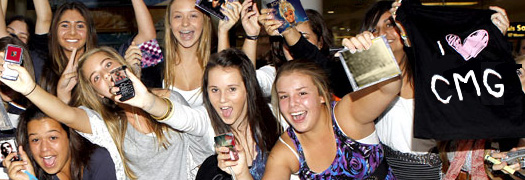
Features | Lists
By The Staff
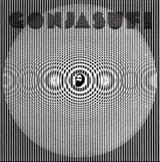
30 :: Gonjasufi
A Sufi and a Killer
(Warp)
2010 provided no shortage of opportunities to be creeped out or scared shitless by music, whether by way of suffering Michael Gira’s personal hell vicariously or submitting body and soul to Salem’s all-night death-rave. But A Sufi and a Killer, Flying Lotus disciple Gonjasufi’s mindfuck of a debut, hints at a subtler terror: this stuff is seriously unhinged, as indebted to J Dilla is it is Tom Waits, and as a portrait of its creator it reveals either a genius or a lunatic or both. And yet despite the Badalamenti sleepwalk of a song like “Change,” which is pretty much the theme song Robert Blake never had, Gonjasufi’s stylistic analog is more Herzog than Lynch: A Sufi and a Killer knows that suffering can be beautiful, yeah, but it blows that suffering up into something bigger than itself, into a kind of scary, half-finished fairy tale (think Grimm, not Mother Goose).
Like Herzog’s best stuff, A Sufi and a Killer is cobbled-together but epic in scope, a homemade pet-project with delusions of grandeur. Check for evidence the deeply self-lacerating “Sheep,” on which Gonjasufi attempts to work through an all-consuming guilt complex by casting his sadism as an immutable function of nature: “I wish I was a sheep instead of a lion / ‘cause then I wouldn’t have to eat animals that are dyin’,” all of it croaked out like breathless last words. It’s a depressing sentiment, but the music which accompanies it—as meticulously and beautifully arranged here as everywhere else on the record—seems to offer, as that gorgeous vocal sample swells, at least the possibility of redemption. Or at least catharsis, from this side of the table: across A Sufi and a Killer Gonjasufi loses his mind, but in recording the breakdown he’s done wonders for us.
Calum Marsh
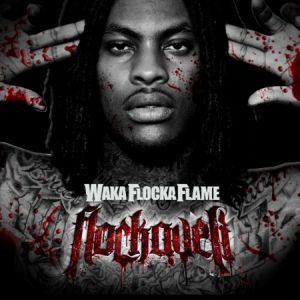
29 :: Waka Flocka Flame
Flockaveli
(1017 Brick Squad/Warner Bros./Asylum)
Listening to Waka Flocka Flame is like hearing the voice of God (or what I imagine it to be): unbearably intense, packed with direct injunctions, and spoken in the third-person. It makes sense, then, that like the Old Testament, Flockaveli is full of commandments and terse assessments of its Creator’s chosen ones. Both are easy to dismiss as unreconstructed hogwash, yet both are nearly impossible to eradicate from the psyche of anyone who pays attention.
For both Waka and God, the indelicacy of divine order demands exegesis on the part of the follower. The Christian God transcends logic, leaving it up to Christians to parse His indelible Word for all time. In the same way, Waka Flocka is a being of impulse, one who explains nothing because, he convinces us, there is ultimately no explanation for anything. Explanations are how mere humans patch together their lives from one day to another in order to prevent the inchoate madness of the universe from driving them insane. Which means explanations change constantly. “When my little brother died, I said ‘fuck school’” is not an explanation. It is a demonstration, from its stomach-clenching delivery down to the hundreds of pages of memoir that are packed like an exploding star into its nine blunt words.
f course, one could say that much of rap is predicated on the idea of words as innately powerful elements rather than signifiers, used intentionally to hold together, to empower tenuous existences. Waka Flocka, then, is pure rap. Vulnerabilities are directly referenced (“I fucked my money up, damn,” is how “Let’s Do It” begins) and then eradicated through a strength that is nebulous enough to seem like faith. There’s the ruthlessly self-edited simplicity of the lyrics—“Hit ‘em with the choppa / Call that shit hot lava”—that when censored, like Obi-Wan Kenobi, become even more powerful than you could possibly imagine. There’re the gigantic, unchanging loops that underpin every song; it’s like Steve Reich fed through a distortion pedal.
And finally, there’s the delivery, always urgent but never anxious. “Front yard, broad day with a SK,” he intones, measuredly, on “Hard in da Paint,” but there’s no gangster paranoia or forced social message in what comes out. The shortening of “broad daylight” into “broad day” feels more like an expansion, a celebration. Waka Flocka is a joyful creator, in full command of his idiom. It can be exceptionally uncomfortable to be in his presence, but that’s because there are volumes of knowledge, warning, celebration, and treatises on how to use gunshots as percussion inside Flockaveli. It’s enough to take into the desert for 40 days and come out glowing.
Chris Molnar

28 :: Grass Widow
Past Time
(Kill Rock Stars)
As has been duly noted, Past Time begs to be viewed through a riot-grrrl lens. The Kill Rock Stars label, the band’s gender makeup, the rigorously driven bass-propelled tracks: they all scream Washington State girl punk. And yet, the first involuntary impression that this album conjures (in this writer if no one else), is the Las Vegas strip via its usual soundtrack of Sergio Mendes + Brasil 66’s “Mas Que Nada”. There’s something in the way the three-part vocals by Raven Mahon, Lillian Maring, and Hannah Lew melt on contact with one another, flowing briefly together before eddying off into different tributaries, that seems outside of punk, and even rock, altogether. Despite the angularity of the guitars and the staunchly square-edged drum rhythms, there’s something of bossa in the way the vocal melodies float above their rhythmic anchors, loosely tethered to chord progressions, buoyed occasionally by strings…and all of Brazil is rolling its eyes right now, so I’ll stop, with apologies. It’s a loose thread, to be sure, but more interesting to pick at than the one coming from Kathleen Hanna’s sweater.
Name-dropping aside, Past Time is a heavy artifact and a worthwhile listen regardless of its exact historical context. It is a meticulously arranged, energetic, yet precise collection of moments, rather than songs—for the songs themselves aren’t distinct in ways we’ve come to expect. There is nothing to be considered the “slow song” or “the single.” Instead, we have a series of tracks of nearly unvarying tempo, instrumentation and intensity. And yet, they outstep boredom easily. While lots of punk groups are known for being one-note, Grass Widow’s textural complexity makes them anything but, even within the limited confines of a being a guitar-based three-piece with little interest in stepping outside of 4/4 time. The recurring materials comprising these tracks are woven together in such an endless array of patterns that it’ll take a crochet hook to parse them. Past Time is a kaleidoscoping vision of what can be done with the tools at hand and enough heads to look at each note from three different angles.
Jessica Faulds
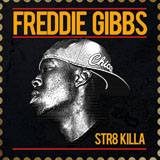
27 :: Freddie Gibbs
Str8 Killa EP
(Decon Records/Gibbs Family)
So I guess Tupac really isn’t dead, huh? Or at least his spirit is alive and well in the ferocious but not entirely unconscious spitting of Freddie Gibbs. I didn’t know there were parts of Indiana as bad as the part Gibbs is from (Gary, IN’s East Side), so the Str8 Killa EP is a new rap education on the state of the Midwest, just not staid or playing the judge as is Midwest underground rap’s wont. No, this stuff is criminal and criminally good; it’s experienced, involved, viscerally eye-opening—not only in content but in the hard form of Gibbs’ flow. His words are strong but elusive, dodging and jabbing with equal parts gritty fight, graceful poise, and sheer survival instinct. And this makes for 2010’s most technically impressive rapping this side of Big Boi. The way Gibbs doubles his flow on highlight (and, in my opinion, one of 2010’s very best singles) “National Anthem (Fuck the World)” is a thing of fleet beauty, sweeping us up instantly into his galloping away from a lethal pressure bearing down, all the while his mind yelling “fuck this” and that ire only growing with the burn in his legs. Outside of “National Anthem” there is plenty to recommend the record: a few glossy Block Beattaz productions, a cool jazz element to the chord progression on “The Coldest,” a sense of minimalism and the voice of the Black Keys’ Dan Auerbach differentiating closer “Oil Money” in its presence and message (“In this lullabye / You got to do right / Before you die”), and etc. But Gibbs’ rapping is always the focus and it’s always worth it. There are no lags in pace, no punches pulled; the PR comes correct—straight killer, no filler.
Chet Betz
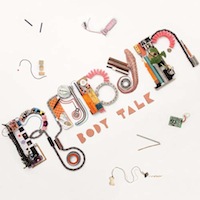
26 :: Robyn
Body Talk
(Konichiwa)
Is it the Swedish thing? It is for the same sinister reasons that the Scissor Sisters never really caught on in America either? All Robyn does is consistently pump out these unbelievable Erasure-style pop songs and continue to receive heaps of praise from snarky online publications like this one, and she’s yet to crack the American mainstream—at least post-Robyn is Here (1995). She even performed “Dancing on My Own” on virtually every late night talk show you can name (not to mention Gossip Girl). What more do you want, Home of the Free?! Has Two and a Half Men irreversibly shattered your brain?
And if there’s any song in her oeuvre that will endure her to U.S. audiences, it’s “Dancing on My Own,” an easy SOTY contender and concentrated sugar rush of throbbing ’80s synths with a skyscraping chorus; it feels like the ecstatic peak of a club night out, though it’s really about heartbreak (as are most of her songs). It’s impossible to improve upon. So of course Robyn’s handlers tried, including a “Radio Mix” on her recent Body Talk compilation—cluttered compared to the immortal version featured on the Body Talk Pt. 1 EP. Robyn did a curious thing this year, releasing two Body Talk EPs two months apart before dropping the full length last month, compiling the highlights of the EPs with four new tracks, which included the Max Martin jam “Time Machine” and full-on electro version of acoustic Pt. II track “Indestructible,” a song in which she (unknowingly?) quotes the melody from Supertramp’s “The Logical Song” in the verses before proceeding to yet another mindblowing chorus.
Body Talk is a revelation, as dud-free a dance pop record as you will find this decade. And yet, in a crafty bit of marketing (the Swedes gave us IKEA after all), you’ll still need the EPs to satisfactorily complete your 2010 Robyn experience, if only because the LP criminally leaves off essentials like the warming synth wash of “Cry When You Get Older” and “Include Me Out.” Robyn (and her producers) has more God-given talent and charisma in her pinky finger than an army of Ke$has have in their entire being, but it still looks like she’s playing 2,500 seat theaters in the States for the foreseeable future. Whether North America can catch up to the rest of the known world and recognize Robyn for the magic she’s crafting is anyone’s guess, but at least “Dancing on My Own” has cemented itself as my karaoke jam for the next twenty years. If that’s not cause for some brain-shattering celebration, I don’t know what is.
David M. Goldstein
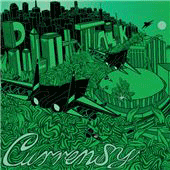
25 :: Curren$y
Pilot Talk / Pilot Talk II
(Roc-A-Fella/Def Jam)
Perhaps in response to the predominance of 808 and synth-driven production in hip-hop over the past few years, rap seemed to get a lot more melodic in 2010. Or at least a lot more great melodic rap records were released. An echelon below Kanye’s opus, a cornucopia of lush, breezy efforts (Wiz Khalifa, the Cool Kids, Stalley, et al.) were gifted us as if exhaled coolly from the lips of a higher power. And Curren$y’s 83 minutes of gregarious audio dope sits perched atop that phylum on an impossibly comfortable couch, chuckling to itself, holding back an inhale, straight crushing its opponents in NBA 2k11.
Both volumes of Pilot Talk are elegantly assembled, with a genuine ebb and flow to their sounds. But perhaps the most jarring aspect of Spitta’s sprawling masterstroke(s) is just how well they cohere. Pre-2010 Curren$y was a mixtape rapper through and through, churning out bars at an alarming rate with mixed results, exhibiting no trepidation in mashing together a slew of tracks that all too often dipped into fodder for the cutting room floor. I mean, dude released seven mixtapes in 2008. 2010 was apparently the year Curren$y learned about a little concept called “restraint.”
Sanding away the garish edges of his earlier work, the New Orleans native finally seems content to let his disaffected magnetism dribble out over slinky productions. There is no overflowing machismo here. There is no monster-voice filter. There is no faux-menacing skimask hooey. Instead: soft rock guitars, sunshine keyboards, and molasses horns. Seriously, the production here is phenomenal—Ski Beatz and Monsta Beatz helm these projects masterfully—and Curren$y makes these shits sing like a navy blue Yankees hat atop a finely-assembled ensemble. His inimitable flow is the mortar of this Byzantine architecture; the production’s pores positively drip with the hallucinogenic elixir that is his delivery. Oh, and Jay Electronica delivers some biblical, verse-of-the-year shit on “The Day.” Pilot Talk is where weed rap starts hitting your dopamine receptors harder than any kush ever could.
Colin McGowan
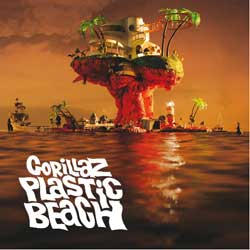
24 :: Gorillaz
Plastic Beach
(Virgin)
We all know that when it comes to guest spots nowadays, Mr. Snoop D-O-Double-G is less than discerning. Katy Perry? Robyn? HBO promo for True Blood? Just show homeboy the money: instant stoned cool blissfully ignorant of the fact that he hasn’t made a good top-to-bottom record since Doggystyle (1994)?
But leave it to Damon Albarn to somehow make Snoop sound vital again. “Welcome to the World of the Plastic Beach” introduces Plastic Beach, Gorillaz’ third record, with the type of butter-smooth, tongue-twisting wordplay that momentarily reminds us that Snoop will always be the eternally laid back motherfucker we used to know and love.
And just as Snoop is required to raise his game after a long period of laziness, so do all of the other guests within Albarn’s latest electro-dub fantasy. This is a world in which De La Soul gamely rap a fake breakfast commercial alongside Furry Animal Gruff Rhys while both Lou Reed and Mark E. Smith put away the surly long enough to merrily spit dry nonsense amongst deeply carved grooves. But while the guest list is several and varied, this is still clearly Albarn’s show. The hired guns never detract from his M.O. of club-ready dub bass lines interspersed with a handful of the most ethereal pop numbers he’s been a part of since Parklife (1994)—back right around the time when Snoop was killing.
Among the headier stuff is convincing grime (“White Flag”), electro-paranoia with underrated Swedish trip-hoppers Little Dragon (“Empire Ants”), and single “Stylo,” which somehow seamlessly integrates both Mos Def and Bobby Womack while being so irresistibly in the pocket that Eddy Grant claims Albarn ripped him off. Equally effective are “Broken” and “On Melancholy Hill,” Kinks-indebted pop numbers serving as a deft counterbalance to the darkened club atmosphere.
Simply stated, Plastic Beach took the CMG staff by surprise. It’s easily the strongest album to bear the Gorillaz name, and one of the most inventive pop albums in recent memory, if only because it does what seemingly few were able to accomplish this year: make the old truly new again.
David M. Goldstein
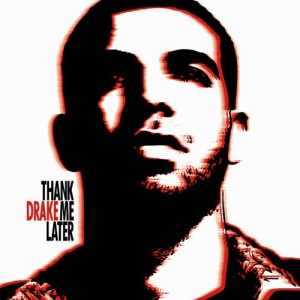
23 :: Drake
Thank Me Later
(Universal Motown)
If Drake has a soul, I don’t wanna know about it. Which may be hard for some to stomach (which is where the soul lives), especially for an album as popular and crowd-pleasing as this, his melodramatic Thank Me Later, spit-shined for ape-shit consumption with some grinning misogyny and heady douchebaggery. So sure in its young swagger and so nubile in its emotional nudity—“Oh,” it coos, “just you wait ‘til you find out what you’re thanking me for”—Drake’s feature-length debut album feels almost wrong to love so much.
But love it we do. And in loving it we may try to reconcile affection and infection with believing Drake’s woes, delivered heart on sleeve, smoothly—big problems in tiny bites—because he sounds so good being so real. But this is still Drake we’re listening to and he still looks like that. I still got Def Jam Rapster and mewled “Best I Ever Had” along to a video where Drake looked like that amongst cartoonish boobs, eyes all twinkling like: “I think what this video needs is more boobs.” He still once proposed to Nicki Minaj.
If that’s true or not, the proposal part, I don’t care. Because I love Thank Me Later. I love it as much as music should be loved, sometimes, when loving something also means taking it as it is. Thank Me Later falls gracefully into that realm, where I love things I must also reluctantly accept, and there it continues, resting, completely pleased with itself. Like his hero and own Birdman figure, Lil Wayne, Drake will not be deterred from the idea of himself, like it, love it, or not, because one has no choice in what aspect of Drake one listens to—Thank Me Later is the Rosetta Stone to understanding Drake—and so one’s love or hate as a listener has no effect on how Drake will translate Drake from now on.
Less exhausting than trying to somehow bend Drake’s will away from looking like that and being that way is to allow Thank Me Later to passively wash over one’s least morally engorged parts. It’s an awfully pretty record, from “Fireworks”—patient grand piano chords and firework ‘bytes crackling like unearthed vinyl, this giving way to crisp, mournful synths and some coital moans grafted smartly over the face of Alicia Keys’ restrained chorus—to “Unforgettable,” which inflates Young Jeezy’s “I’m talking his and her firearms” into something pointillist, mural-ed from goose pimples. Leave it to Jeezy to reach into the heart of a chant and yank out its song: “I’m doing my thang / I’m doing my thang.” That Jay-Z responds not three minutes later in “Light Up” with “Triple entendre, don’t even ask me how / ConEdison flowin’ connectin’ to a high power,” is both succinct and magnanimous apology for Drake’s delusions of grandeur and an infinitely more eloquent take on what it was ICP’s “Miracles” was supposed to be about. That Lil Wayne offers his own addendum not two and a half minutes later—“Ewwww, that’s nasty”—makes the album feel near Platonically whole.
Not that ICP really had anything much to say with “Miracles,” just that they were attempting to express the magnificence of something unexplainable, something majestic, with a song as empty as it was reasonably good-natured in its ignorance. Fucking mainstream rap, how does it work? Drake, as well as everyone involved with Thank Me Later, seem to know well. And so, this mainstream rapper—adored by many, but loved by how many?—is taking stock of his life in the currency he knows best: fame, money, sex, not efficient or formal, but final causes for quotidian success. He begins, “Money just changed everything / I wonder how life without it would go / From the concrete who knew that a flower would grow?” and end, “And, so—OK…,” as if the fulfillment of the titular demand should complete his record.
And underneath the necessities of fame, fortune, and fucking, Drake allows insanely deep fissures in the mix to portion his cadence, echoed caverns of synth to burrow under his hubris, and aimless but holy choirs of voices to fill the subterranean punishments awaiting him should he slip through the cracks. Which is where maybe his soul dwells, far, far below that sweet voice and that seamless canter, left to the abyss of his stomach. “Don’t be fooled by the money,” he tells a prospect, but it’s hard not to believe he’s reminding himself of the same. Which is maybe what he shares with all of you: the disbelief that someone who makes this music also raps—and sometimes sings—about all that.
That’s what you do when you search for his soul: you excuse that for this. Me? I don’t do that. I don’t look too hard. I’d rather just hear it for what it is: something nasty, something majestic, something unexplainable. Drake, you’re welcome.
Dom Sinacola

22 :: Black Milk
Album of the Year
(Fat Beats)
Scott: Aaron, can you write a blurb about the Black Milk album for the year-end?
Aaron: Don’t have time Scott, sorry.
Scott: C’mon.
Aaron: What can be said about it anyway. Best produced album of the year, blah blah, not as big a deal as Kanye because he hasn’t insulted a president on national television yet. Most underrated production ever.
Scott: Cop out.
Aaron: No, best produced album of the year. Autobiographical lyrics that you either love or hate, but best beats of the year.
Scott: Our top ten will have something to say about this.
Aaron: This record should be in there jostling for elbow room and I’m pissed that it isn’t.
Scott: Cop out.
Aaron: Best produced album of the year. Probably the only drums in hip-hop that hip-hop producers can feel ok sampling, including Kanye’s. I love this record and think it got unjustifiably glanced over and will protectively knee-jerk a “fuck off” at anyone who says otherwise.
Scott: Ok ok shut up already I’ll get Clay to do it.
Aaron Newell
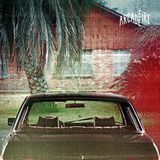
21 :: Arcade Fire
The Suburbs
(Merge)
Let’s be honest: the last time you listened to Neon Bible (2007) was—? Guh, 2007 seems so long ago. A few of the car-themed tracks remain quality staples for the live show, but, while hardly horrendous, it’s still, on the whole, aged pretty poorly. Widescreen goth: simply not a good look for the band. And lyrics like “Eating in the ghetto / On a hundred dollar plate!” (from B-game Cure sound-alike “Black Wave/Bad Vibrations”) weren’t doing them any favors.
So if The Suburbs is more or less a total comeback, it’s due to the fact that the overarching subject matter is once again completely within the Arcade Fire’s wheelhouse. Ruminations on being raised between a driveway and backyard, with equal amounts of nostalgia and dread (mostly dread), are far more suitable to this band than the one-note noir of, say, “Black Mirror.” Win Butler grew up outside of Houston, for example, where the “suburban war” with “your part of town against mine” could be a reference to his home state’s obsession with high school football. “Half Light II (No Celebration)” and “We Used to Wait” both bemoan the loss of youthful innocence in the guise of anti-technology screeds, the former over a guitar and sequencer crunch that oddly resembles Rod Stewart’s “Forever Young” cover (…without sucking). By focusing on the personal as opposed to Neon Bible‘s popular Issues, the Arcade Fire are back to making music more comfortably overblown that importantly Big.
That said, The Suburbs is a far more subtle record than anything we’ve come to expect from the band, taking an uncharacteristically long amount of time to reveal its charms. Leading off with a ballad is a curious decision, and about halfway through it becomes clear there will be no immediately obvious crowd-pleaser on par with either “Wake Up” or “Neighborhood #1.” It’s at least fifteen minutes too long, diluting the effectiveness of Side-B twin climaxes “We Used to Wait” and Blondie-esque synth-odyssey “Sprawl II (Mountains Beyond Mountains).” (“Wasted Hours” is an unintentional commentary on a song that clearly should have been cut.) But give it enough time, enough patience—the band’s earned it—and what emerges, care of both the sequencing and pace, is something akin to a mid-‘90s Yo La Tengo record, a generous variety of seemingly disparate but similar parts gracefully assembled into something much greater.
Really though, The Suburbs‘s need of an editor is a minor quibble, and when an indie band attains the degrees of success that the Arcade Fire currently have, haters are always gonna hate: they’re trying too hard to be Radiohead, they have no sense of humor, they only have so many band members so one of them can bang a drumstick against another’s helmet-clad head (eat a dick, Kings of Leon). Their albums are unapologetically ambitious, and the live show equally legendary. They’ve earned the right to these indulgences. And we should feel grateful that The Suburbs is such a successful document of that liberty.





